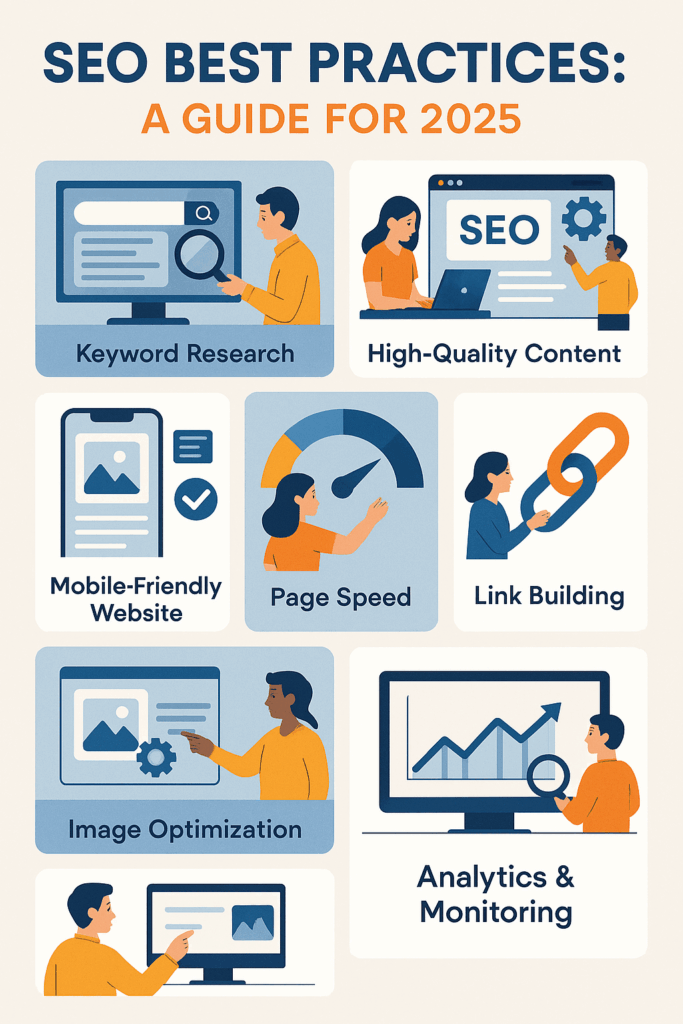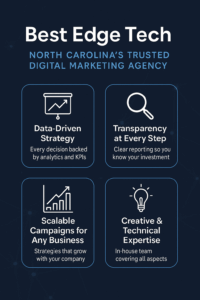Search engine optimization is always evolving. Each year, Google updates its algorithm hundreds of times. For your business to stay competitive, you must adapt to modern SEO best practices 2025. These new standards reward high-quality content, mobile-first experiences, and trustworthy authority signals.
This guide breaks down what matters now—and what’s coming next in the SEO world—so your website can stay visible and grow its organic traffic.
Why SEO Is Still Critical in 2025
Even with the rise of AI-generated content and voice search, SEO remains essential. Why? Because 68% of all online experiences start with a search engine. Organic traffic remains the highest-converting source of visitors for most businesses.
SEO also gives businesses long-term visibility. Unlike paid ads, the traffic you earn from great rankings continues to generate leads and sales over time.
1. Focus on Search Intent, Not Just Keywords
Gone are the days when keyword stuffing worked. Today, Google focuses on understanding what users truly want. That’s why modern SEO starts with search intent.
Each keyword has an intent type:
-
Informational (“how to increase website traffic”)
-
Navigational (“Moz keyword tool”)
-
Commercial (“best CRM software for dentists”)
-
Transactional (“buy SEO audit services”)
Align your content with these intents to improve rankings and engagement.
2. Use Helpful, People-First Content
Since the 2022 Helpful Content Update, Google rewards content written for users—not just search engines.
That means:
-
Write clearly and directly
-
Answer user questions early in the post
-
Avoid fluff or filler
-
Back claims with reputable sources
-
Offer real expertise and original ideas
Content that solves problems ranks better and earns more links and shares.
3. Make Mobile UX a Top Priority
Google uses mobile-first indexing, which means your site’s mobile version is what gets ranked.
To optimize mobile UX:
-
Use responsive design
-
Improve loading speed on cellular connections
-
Avoid pop-ups and intrusive ads
-
Increase font size for readability
-
Place buttons far enough apart for tapping
A smooth mobile experience reduces bounce rates and boosts rankings.
4. Prioritize Page Speed and Core Web Vitals
Page speed directly impacts your search rankings and user satisfaction. Google tracks Core Web Vitals, which measure:
-
Largest Contentful Paint (LCP): Loading speed
-
First Input Delay (FID): Interactivity
-
Cumulative Layout Shift (CLS): Visual stability
Use tools like Google PageSpeed Insights and GTmetrix to optimize these metrics.
5. Build Topical Authority with Content Hubs
Search engines prefer websites that are experts on a topic. You build this by clustering related content around a central pillar page.
For example, if your site sells digital marketing services:
-
Main page: “Digital Marketing Services”
-
Supporting posts: “Benefits of SEO,” “What Is PPC?” “Social Media Ad Tips”
Interlink these pages to show Google your authority and improve rankings across the board.
6. Optimize for Featured Snippets
Featured snippets appear above standard results. They answer questions directly and drive more clicks.
To win a featured snippet:
-
Use clear headers like “How to…” or “Step-by-step guide”
-
Use bulleted or numbered lists
-
Keep paragraph answers under 50 words
-
Use schema markup where appropriate
These small adjustments can land you position zero, even if you’re not ranked #1.
7. Refresh Old Content
Don’t just publish—optimize what already exists. Updating old posts with fresh stats, better structure, and improved keywords can lift them back up in search results.
Focus on:
-
Pages that have dropped in traffic
-
Older content with outdated information
-
Posts with thin content (under 500 words)
Refreshing content saves time and maintains your site’s authority.
8. Earn High-Quality Backlinks
Links still matter in 2025—but only if they come from trusted, relevant sources.
Avoid shady link schemes and focus on:
-
Guest posting on respected blogs
-
Creating link-worthy assets like infographics
-
Building citations in local and industry directories
-
Earning mentions through PR or interviews
Each backlink acts like a vote of confidence in your content.
FAQs About SEO Best Practices 2025
How often should I update my SEO strategy?
Review your strategy quarterly. Update keywords, check rankings, and track Core Web Vitals to stay current.
Source:
Google Search Central – Core Web Vitals
Do AI tools help or hurt SEO?
AI can assist with research, but human input is critical for originality, tone, and real expertise. Use AI carefully.
What is the best SEO tool for small businesses?
Popular tools include Ahrefs, Semrush, and Ubersuggest. Google Search Console is a must-have, and it’s free.
Is link building still relevant in 2025?
Yes—but quality matters more than quantity. Focus on earning links from trusted sources in your niche.
Final Thoughts
Mastering SEO best practices 2025 means staying flexible, focused, and user-first. From mobile speed to content clusters and search intent, every part of your strategy should aim to improve experience, answer questions, and build authority.
SEO may change, but the goal remains: serve your audience better than your competitors.
Call to Action
Want to boost your rankings this year?
📞 Contact Best Edge Tech today




